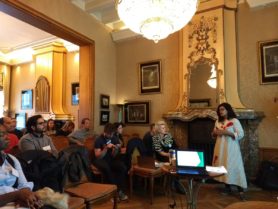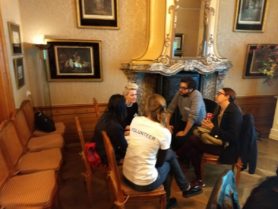News
Innovative Session on anticipatory climate governance in the world’s vulnerable regions

While anticipatory practices such as climate scenarios and participatory foresight methods are increasingly used to adapt to and shape uncertain climate futures, there is little research on how such engagement with the future impacts governance and policy choices in the present. The research gap in regions most vulnerable to climate change impacts is especially significant.
To tackle this problem, RE-IMAGINE researchers Karlijn Muiderman, Joost Vervoort, Maliha Muzammil, Charlotte Ballard, along with CCAFS regional coordinators Lucas Rutting (West Africa), Marieke Veeger (Central America) organised an Innovative Session at the Earth System Governance Conference held in Utrecht in November 2018.
The session aimed to interactively brainstorm about the latest research findings from the RE-IMAGINE project in four vulnerable regions, West Africa, South Asia, Southeast Asia and Central America. The session aimed to get a better understanding of cross-regional similarities, differences and connections, and generate recommendations for improving RE-IMAGINE’s anticipatory governance research framework. Conference participants with practical experience and/or interest in climate governance and climate foresight were invited to join the discussion.
Scrutiny of the underlying assumptions in anticipatory practices limited
In the face of uncertain climate futures, governments and other actors are increasingly using foresight to help imagine and experiment with future climate conditions and guide their adaptation and mitigation planning.
However, a recent publication by RE-IMAGINE PI and co-PI Joost Vervoort and Aarti Gupta puts forward that scrutiny of the underlying assumptions is generally limited in such anticipation practices. Particularly assumptions of the extent to which the future can be known and managed are not made explicit, and how policy-making processes are shaped based on these conceptions of the future. This is problematic; due to the proliferation of anticipation practices in research and policy, the future is increasingly becoming an object of design and of political negotiation.
At the same time, multiple research communities are deploying the notion of anticipatory governance to denote novel forms of governance that involve development of steering mechanisms in the present in order to imagine, adapt to and/or shape uncertain futures. In these theories, anticipation practices play an important role in exploring and imaging the future under uncertainty. However, these communities all inhibit different epistemological perspectives, seeing various roles for anticipation practices, who should be involved and why, which ultimately proposes heterogeneous policy implications. Most urgently, there is little known on the implications of these differences for anticipatory governance in practice.
Discussing the applicability of RE-IMAGINE’s research framework
Building on Vervoort & Gupta’s publication, an analytical framework developed by Muiderman et al (forthcoming) assesses the various forms of anticipatory governance, bringing forward the following important analytical questions:
- What is the motive for undertaking an anticipation practice undertaken?
- What the mechanisms and tools are used?
- Which actors were involved?
- How are conceptions of the future understood to impact policy and governance choices in the present?
These questions serve as an analytical lens to study anticipatory governance in practice.
During the Innovative session, the RE-IMAGINE team and the conference participants split into four groups based on regional experiences in West Africa, South Asia, Southeast Asia and Central America, and discussed applicability of the research framework for each of the four regions.


West Africa
- The policies and anticipation processes selected as cases were well received.
- The research framework was believed to be well designed and suitable to answer the research questions.
- There is a disconnect between the state and local level. Local governments are often responsible for policy, and have more power, and therefore the project should consider including local level stakeholders.
- Local level stakeholders are better aware of local conditions. If they are not involved in scenario planning then resulting policies are less likely to be implementable due to a lack of understanding of local conditions.
- The geographical scope of foresight processes is often on the national level, while regional influences on the national context can be quite important.
- Cultural views of stakeholders involved in processes influence the futures envisioned and this should be recognized in the research design.
Southeast Asia
- There is a need for capacity for discussion, i.e. a need to “learn to disagree”, both at the level of ASEAN and the national level.
- Different, sometimes opposing, narratives on climate change exist alongside each other. There is a need to take into account more ‘informal’ narratives of, mostly, non-state and local stakeholders.
- Different development organizations and governments operate on basis of competing frameworks, which causes confusion. There is a need for different key players to be honest about the fact that there is no perfect conceptualization of climate change and action to combat it.
- Culture and religion play a big role in Southeast Asian countries. Donor/developmental organizations should be aware of the local contexts.
South Asia
- It is important to look at the time scale of the scenarios formulated, how has it changed over time
- Generally, participatory foresight approaches and quantitative modelling and data are perceived to be complementary. Some participants believe that governments take quantitative exercises more seriously.
- There is s a need for better involvement of the communities most vulnerable to climate change
Central America
- Foresight processes offer great potential to plan for climate displacement (both within the region and from outside the region) and urban flooding risks. Cities are still very much concrete jungles, marked by traffic and waste management problems, and these issues require attention in governance research.
- Participants showed interest in foresight (in particular scenarios) methodology, in understanding the differences between foresight and predictions, and how to go further than only looking at climate scenarios.
Insights from the Innovative Session
The group discussions added valuable insights that help to further contextualize the work of RE-IMAGINE in each region. The research design was generally well received, and was considered to be timely and important research. While in most of the regions participatory scenario planning has had limited used in the last decade, it has recently become a popular choice of participatory research method and is used more regularly.
Generally, participatory foresight approaches and quantitative modelling and data are perceived to be complementary. Some participants believed that governments take quantitative exercises more seriously, which is interesting given the future is generally framed as less uncertain in quantitative compared to qualitative approaches. This is also a focal point in the project: to see if these different conceptions of the future matter for the policy choice they generate.
All regional groups discussed issues pertaining to inclusion of the local government and communities. There is a disconnect between the understanding, knowledge and applicability of findings at the different levels. Also, awareness of an apparent disconnect between levels of governance is considered important, as in many instances the local government or local communities are not involved in the high level discussions at the national level.
What’s next?
These findings will feed into the work the research team is currently undertaking. Four regional publications are underway that apply the RE-IMAGINE theoretical framework to anticipatory processes in climate adaptation planning in its four global regions. In these papers, we comparatively analyze how different anticipatory processes inform policy-making on climate adaptation in West Africa, Central America, South Asia and Southeast Asia. Each paper will analyse over 30 individual foresight processes. You can read more about West Africa regional study here.
Recommendations from these analyses will be used to inform and improve anticipatory climate governance in the regions through a series of capacity-building meetings with key experts working on the foresight-policy interface, both at the national and the regional level, aiming to be a chain of interventions towards institutional change.

